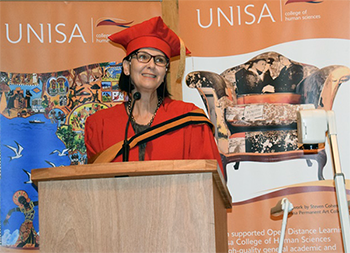College of Human Sciences
Remaining relevant: Reflections on critical incidents in psychological test development in SA

In her lecture critical incidents in the South African context that affected test development policies and practices since the mid-1980s were considered. She used anecdotes and personal perspectives to illustrate the response to these incidents and highlighted the implications thereof for the test development domain.
The presentation was structured in terms of three topics, namely infrastructure and ideology; the challenge of regulation and training as a shared responsibility; and methodological developments and conceptual concerns. The emphasis was on relevance in the local context – an issue that continues to shape this domain.
“This is not an exhaustive discussion of the local history of testing. However, it does show how the need for relevance shaped this domain, enabling it increasingly to make positive contributions towards a more inclusive society. In a passionate and proactive manner, role players have been exerting themselves to keep this domain relevant.”
Providing a bit of background, Professor Van Eeden said that assessment as a discipline was first proposed at the end of the seventeenth century and continued to develop as a scientific method. She said events in the United States and Europe in the early twentieth century firmly established objective measurement, or testing, as part of the discipline of psychology. Such assessment remained popular until World War II, after which resistance against the practice developed in the United States and some European countries.
“Sentiment again shifted, though, and for the past 50 years, practitioners have regarded psychological assessment measures as indispensable in ensuring informed decision-making in the case of individuals, groups and organisations. The topic of psychological assessment in multicultural contexts has dominated this period, both internationally and in South Africa,” she said, adding that one should note that the term psychological assessment refers to a multifaceted process in which psychological tests, the focus of this presentation, is but one source of information.
Professor Van Eeden said that test development and test use in the South African context have been and continue to be influenced by the country’s socio-political history. The question of testing has consequently been one of the most controversial areas in the local history of psychology.
“Various authors discuss how an environment characterised by unequal resources and opportunities, that were based on racial categorisation, negatively influenced assessment related research and practice. As early as 1916, local adaptations of international tests of cognitive ability were undertaken. Practices in the ensuing years are reflected in the well-documented controversy around the multicultural use (and often misuse) of assessment measures. Socio-political changes resulted in a shift towards more inclusive test-development policies and practices during the 1980s under the auspices of the Human Sciences Research Council (HSRC). The HSRC was at that stage the main psychological test provider in South Africa.”
Addressing the first of three topics, infrastructure and ideology, Professor Van Eeden said this deals with the decentralisation of test development when the state-supported HSRC relinquished its role as test publisher. This responsibility shifted to multiple role players, implying a change in test-development infrastructure. Changes in the collection of available tests have been slow, but policies and practices have been shifting towards greater inclusivity.
The second topic, the challenge of regulation and training as a shared responsibility, referred to the fact that statutory control became more dynamic owing to the increased involvement by different stakeholders, said Professor Van Eeden. She added that professional bodies and societies have been active in the development of local policies and the implementation of international guidelines. “Academic institutions, furthermore, are responding to concerns regarding sufficient and relevant training opportunities.”
The last topic of her presentation was on methodological developments and conceptual concerns. This topic she said illustrates the advances made in the field, but also the complexity of efforts to contribute constructively. Despite the use of sophisticated techniques to ensure equivalence, the influence of socio-cultural factors on test performance continues to pose challenges to assessment in diverse contexts. “Stakeholders acknowledge the value of testing in the assessment process. However, a shift from traditional approaches has been proposed and recommendations have been made for indigenous tests that are more suitable to the local context.
In concluding her lecture, Professor Van Eeden said that psychological assessment is regarded as central to the profession of psychology. Consequently, it is listed as a core competency in the scope of practice of professionals.
“In response to continued challenges, the various stakeholders responded with a reaffirmation of the value of assessment, reconceptualisation of the scope of assessment, and innovations in the development of measures. Dialogue and debate amongst academics, test publishers and professional and legal bodies remain pertinent.
“Nonetheless, the lack of resources implies that professionals are often obliged to rely on the available body of tests, many of which are still questionable in terms of cultural and linguistic appropriateness. The continued popularity of these tests may, for many, symbolise little change from past practices. Even when a test is scientifically valid and reliable, the method of assessment might still be perceived as negative by those being tested. Educating the public will go a long way to disperse the myths surrounding psychological assessment.”
Professor Van Eeden’s inaugural lecture was streamed live via the College of Human Science’s Facebook page. Click on this link to watch it: https://www.facebook.com/1015655578451986/videos/988237344693783/
You can read the full version of Remaining relevant: Reflections on critical incidents in psychological test development in SA here.
* Compiled by Rivonia Naidu-Hoffmeester
Publish date: 2018/11/07

 Unisa co-hosts G20 community outreach in the Eastern Cape
Unisa co-hosts G20 community outreach in the Eastern Cape
 Unisans gain membership of prestigious science academies
Unisans gain membership of prestigious science academies
 Advocating for disability transformation through servant leadership
Advocating for disability transformation through servant leadership
 Unisa Press continues to illuminate the publishing space
Unisa Press continues to illuminate the publishing space